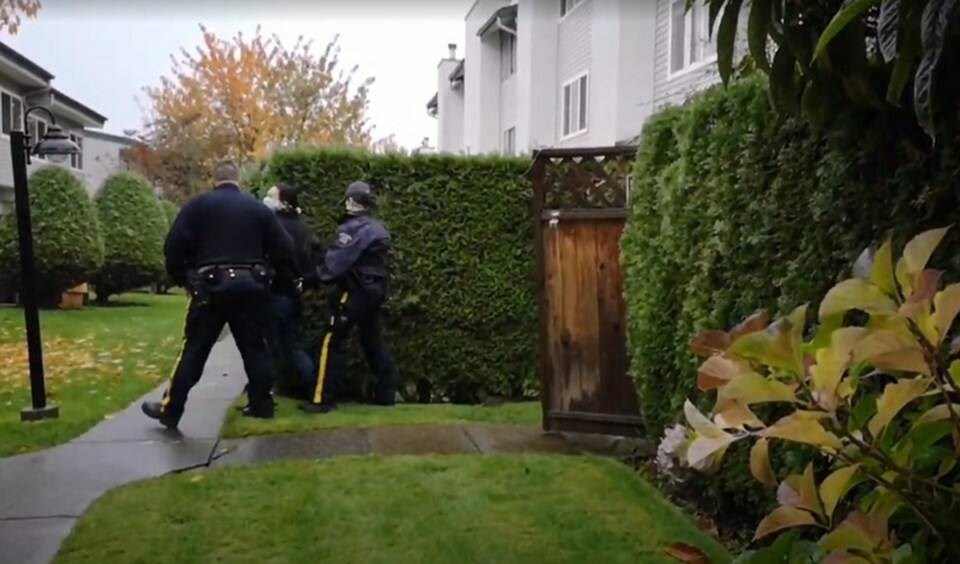What started as a dispute between North Vancouver strata neighbours has ended in jail time for Emily Yu, the woman who ran an illegal 15-bed hostel out of her three-bedroom townhouse in Central Lonsdale.
A North Vancouver provincial court judge handed down a 30-day jail sentence for Yu Friday (Oct. 14) morning after she was found guilty of disobeying a court order. It follows a protracted court process dating back to 2017.
Yu had been ordered by the province’s Civil Resolution Tribunal to comply with her strata’s bylaws and stop using her home for short-term rentals, which she had advertised as the Oasis Hostel on airbnb and Hostelworld.com. Neighbours told the court it was “hell” living next to the constant disruptions, security concerns and late-night partying and drug use, living next to an unlicensed hostel. Yu was later found in contempt of court and fined $5,000 for continuing to flout the strata’s bylaws and the judge’s orders.
Yu eventually complied with the bylaws and shut down the short-term rental business, but she failed to pay back $52,100 in legal bills her strata racked up in the court process, as she had been required to do, and a B.C. Supreme Court judge ordered that Yu’s unit be seized and sold.
In November 2020, court-appointed sheriffs and real estate agents came to show the townhouse to a prospective buyer, but Yu had padlocked the gate and refused them entry, resulting in her arrest and a criminal charge of disobeying a court order.
Throughout her trial, Yu demonstrated a “contempt for the process and the rule of law,” Judge Joanne Challenger said in her sentencing decision, Friday.
“She was often argumentative, accusatory and defiant,” Challenger said, adding that Yu insisted that witnesses in the case and even the judge were imposters, and that she had been the victim of identity fraud. Yu was routinely late to court and failed to turn her cellphone off, as directed.
Yu blamed her lack of compliance with the court order on a poor understanding of English, which Challenger said was “ludicrous” given her obvious competence in English at trial and in her life outside the court process.
“At the time of the offence, Ms. Yu was capable of responding rationally to the circumstances, and had a full understanding of the nature and validity of the orders and simply refused to comply because she did not agree with the results of the litigation,” Challenger said.
Yu’s mental health was at question in the sentencing but, Challenger said it was not a factor in the end result.
“I find that fantastical theories and unfounded suggestions made during the trial before me, including her assertion that she’s still the lawful owner of the townhouse, were the product of the mind of a desperate person who likely has an unhealthy personality construct,” Challenger said.
But Yu failed to show up for meetings with a court-appointed psychiatrist, who had been asked to prepare a report detailing whether and how any personality disorders Yu has were a factor in her behaviour, which may have resulted in a more lenient sentence.
“I am unable to conclude, due to lack of evidence, that any disorder contributed to the commission of the offence before the court and thus, her moral culpability cannot be seen to be diminished. Ms. Yu bears full responsibility for the events,” Challenger said. “I also conclude that despite her issues, whatever they may be, she has acted purposefully and with a view to escaping liability, and has said and done whatever she saw in the moment would best serve her ends.”
Through the process, Yu has never taken any responsibility or shown any remorse for her actions, Challenger said. In April 2021, after the townhouse had been sold, Yu came back to the complex with a U-Haul van, broke into her former home and attempted to move her furniture back in. She was later charged with mischief but the Crown stayed the charges after Yu was found guilty of the original charge of disobeying a court order.
And as recently as the summer of 2022, Yu was still denying the townhouse no longer belonged to her, Challenger noted.
At a sentencing hearing last month, Yu submitted she should not receive any punishment, arguing it would not be in the public interest. The Crown initially sought a sentence consisting mainly of probation, but Challenger warned that wouldn’t be acceptable. The Crown later submitted that a jail term of 14 to 30 days would be in line with previous sentences handed down for similar offences.
Challenger’s sentence came down at the high end of that range “to denounce such conduct and deter others.” Challenger said what was most at stake in the sentencing was sending the message that the rule of law carries meaning and that the courts will not tolerate behaviour that “undermines the foundations of society.”
“It is the rule of law which distinguishes civilized society from anarchy. Everything which we have today and which we cherish in this free and democratic state, we have because of the rule of law,” Challenger said, quoting from another judge’s ruling in a similar case.
Following her 30 days in jail, Yu will face one year of probation during which she is explicitly prohibited from going within 100 metres of her former townhouse.
After the judge left the courtroom, two court sheriffs placed Yu in handcuffs and led her to cells. Multiple times on the way, she had to be told to stop resisting.



